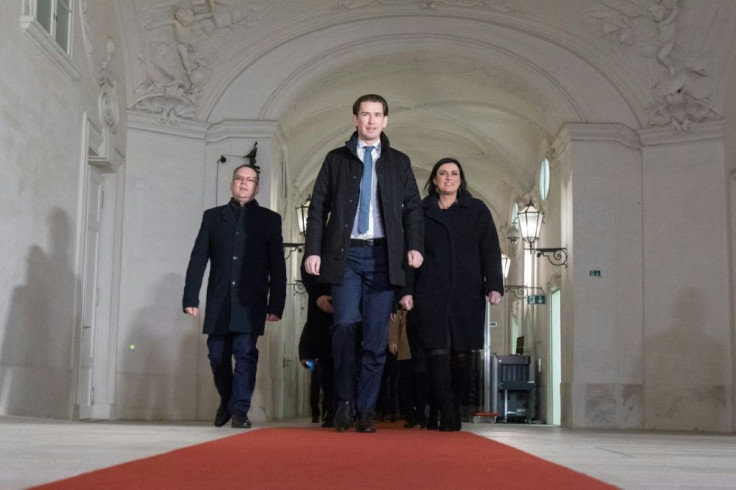Coalition 'Gambles' On Making Austria Carbon Neutral By 2040

Austria's first coalition between conservatives and Greens announced Thursday that it would aim for carbon neutrality by 2040 to make the country a European "forerunner" in climate protection.
The two disparate parties have agreed to govern in what Greens leader Werner Kogler called a "gamble" after key election gains in September.
Their alliance means People's Party (OeVP) leader Sebastian Kurz, 33, returns as chancellor after his previous coalition with the far-right broke apart earlier this year owing to a corruption scandal.
It marks the first time the Greens enter government on a national level though the OeVP holds on to controversial anti-immigration measures that have deeply divided Austrians.
"It's worth the gamble" to work with the conservatives, Kogler told reporters when presenting the government programme.
The carbon neutrality goal -- meaning greenhouse gas emissions are balanced with measures that absorb or eliminate carbon -- is ahead of Europe's 2050 ambition.
But the 300-page government programme also highlights security needs, the conservatives' main campaign platform.
"Migration will stay at the heart of my politics," said Kurz, who has styled himself as a tough anti-immigration fighter, reiterating his view that the coalition's parties had "succeeded in uniting the best of both worlds".
European Council President Charles Michel said 2020 began with "great news from Austria".
He tweeted: "25 years after its accession, Austria renews its commitment to the European project and is set to become a leader in the fight against climate change."
Observers say Germany and other nations could follow suit for the unlikely marriage of conservatives and ecologists as politicians seek to cater to voters' increasingly populist sentiments as well as worries about climate change.
But many have also warned that the alliance stands on thin ice as particularly the Greens have made key compromises.
A column in the left-leaning Standard on Thursday described the coalition as a "daring experiment" and a "political adventure". Tabloid Oesterreich billed the OeVP as "powerful as never before".
Kurz announced his party would head 10 ministries, including the interior, foreign, defence and finance.
The Greens will have charge of an enlarged environment ministry, as well as hold the justice, social affairs and sports and culture portfolios with Kogler, 58, nominated as Kurz's vice-chancellor.
In September polls, the Greens gained 13.9 percent of the vote in their best-ever result as the environment replaced immigration as top concern.
The Oe Vp got 37.5 percent as disappointed voters of the scandal-tainted far-right Freedom Party (FPOe) flocked to Kurz's party.
It will now be up to the Greens' almost 280 delegates to give the final go-ahead to the agreement at a party congress on Saturday. The new government is then expected to be sworn in next week.
Among a raft of proposals, the programme spells out that all energy should come from renewable resources by 2030 and for more to be invested in public transport.
Though renewable energies already account for about a third of Austria's consumption -- almost double the EU average -- the nation of 8.8 million people has been among few EU members that have seen their greenhouse gas emissions continue to increase between 1990 and 2017.
Regarding immigration and security, the coalition wants to introduce preventive detention and extend the headscarf ban for school girls -- clauses which will be hard to swallow for some Greens.
Political analyst Johannes Huber told AFP that the alliance had a "50-50 chance" of survival, depending on which topics came up in the next few years.
Standard daily columnist Eric Frey also wrote that Kurz and Kogler would need a "skillfulness as few politicians before them" should tricky issues arise, such as a surge in the number of asylum seekers, worsening climate change or an economic downturn.
Opposition leaders have already criticised the new coalition, with the Social Democrats (SPOe) saying the Greens have failed to make a mark, while FPOe leader Norbert Hofer said the programme contained "mainly hot air".
But both the SPOe and the FPOe are weakened, with the Social Democrats suffering their worst-ever results in the September polls and the far-right tumbling after the "Ibiza-gate" graft scandal brought down their then-leader and vice-chancellor in May, causing the government to collapse.
© Copyright AFP 2024. All rights reserved.





















